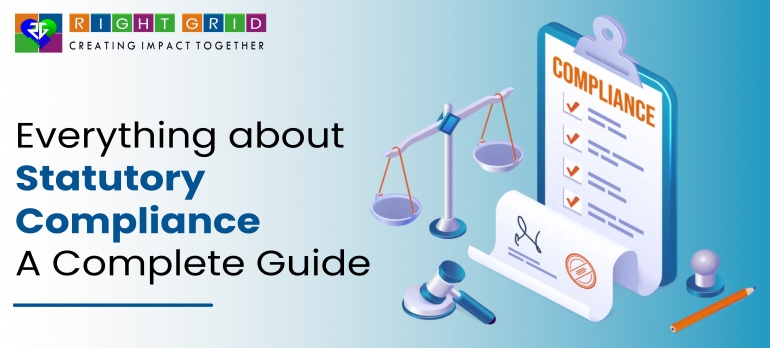
Everything About Statutory Compliance - A Complete Guide
Statutory compliance is an essential aspect of any organization's operations. It refers to the adherence and conformance to the laws, rules, and regulations set forth by the government and relevant authorities. Failing to comply with these mandates can lead to severe consequences, including fines, penalties, and reputational damage. In this comprehensive guide, we will delve into the significance of statutory compliance, its key components, and how organizations can ensure full compliance to avoid legal pitfalls.
Understanding Statutory Compliance:
Statutory compliance encompasses a wide array of laws and regulations that businesses must abide by, depending on their industry, location, and size. These can include labor laws, tax regulations, environmental laws, data protection requirements, and more. The primary objective is to ensure fairness, safety, and accountability in business practices.
Importance of Statutory Compliance:
Compliance with statutory laws is crucial for several reasons. Firstly, it helps maintain a level playing field for businesses, preventing unfair advantages for non-compliant entities. Secondly, it protects the rights and welfare of employees, consumers, and the general public. Thirdly, compliant organizations build trust and credibility among stakeholders, attracting potential investors and customers.
Key Components of Statutory Compliance:
1. Labor Compliance:
This involves adhering to employment laws related to minimum wages, working hours, overtime, leave policies, and workplace safety standards.
2. Tax Compliance:
Businesses must comply with tax regulations, including filing accurate tax returns, paying taxes on time, and adhering to applicable tax deductions.
3. Environmental Compliance:
Ensuring environmental regulations are followed to minimize the impact of business operations on the environment.
4. Data Protection Compliance:
Organizations handling personal data must adhere to data protection laws to safeguard sensitive information of customers and employees.
5. Corporate Governance:
Compliance with corporate laws and regulations to maintain transparency, accountability, and ethical conduct within the organization.
Challenges in Achieving Statutory Compliance:
Complying with an ever-evolving landscape of laws can be challenging. Some common obstacles include interpreting complex legal jargon, keeping track of frequent regulatory changes, and implementing compliance measures across multiple departments.
Steps to Ensure Statutory Compliance:
1. Awareness:
Stay updated on relevant laws and regulations that apply to your business.
2. Dedicated Compliance Team:
Designate a team or individual responsible for overseeing compliance matters.
3. Risk Assessment:
Conduct periodic risk assessments to identify potential compliance gaps and vulnerabilities.
4. Training and Education:
Train employees about compliance requirements and the consequences of non-compliance.
5. Implement Compliance Policies:
Develop and implement comprehensive policies and procedures aligned with relevant laws.
6. Regular Audits:
Conduct regular internal audits to ensure adherence to compliance policies.
7. Seek Legal Guidance:
Consult legal experts to interpret complex laws and ensure proper compliance.
Conclusion:
Statutory compliance is not just a legal obligation; it is a critical aspect of responsible and sustainable business operations. By understanding the importance of compliance, identifying key components, and implementing proactive measures, organizations can navigate the regulatory landscape successfully. Upholding statutory compliance ensures that businesses not only avoid legal repercussions but also build a reputation as responsible and trustworthy entities in their respective industries.
